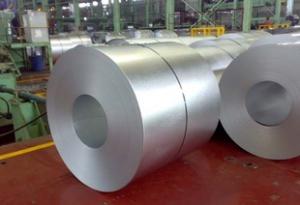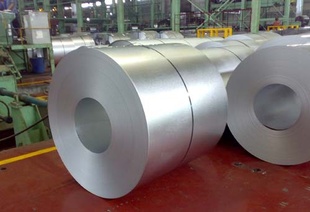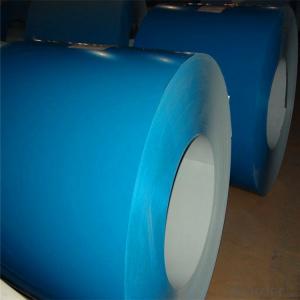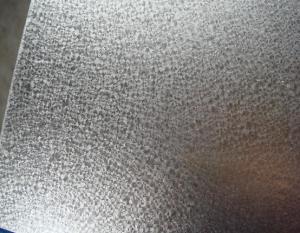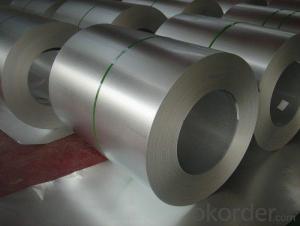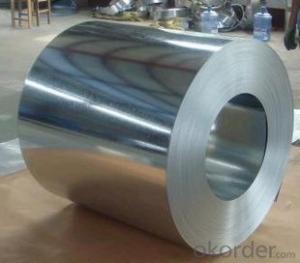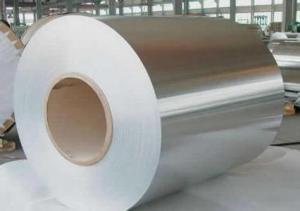Hot dipped Aluzinc Steel Coil
- Loading Port:
- China Main Port
- Payment Terms:
- TT OR LC
- Min Order Qty:
- -
- Supply Capability:
- -
OKorder Service Pledge
Quality Product, Order Online Tracking, Timely Delivery
OKorder Financial Service
Credit Rating, Credit Services, Credit Purchasing
You Might Also Like
PREPAINTED ALUZINC STEEL COIL
Specification:122O*O.45
Steel Grade & Standard: CG20140923
AZ150
Surface Treatment: non-chromate, oiled
Coil ID:508mm Coil Weight:6-10MT
Package Type:EYE TO SIDE
Thickness Tolerance:+/-0.02mm Width Tolerance:+/-5mm
Zinc Coating Tolerance:-/+10g/m2
- Q: Whats the difference in composition? When LTCS is used generally?Whats the temperature range, that these materials can be used? Is there any relation between Killed carbon steel, LTCS, stainless steel, carbon steel(normal)? How to categorise/classify these?Thankyou very much in advance..
- This Site Might Help You. RE: What is the difference between LTCS and Carbon steel? Whats the difference in composition? When LTCS is used generally? Whats the temperature range, that these materials can be used? Is there any relation between Killed carbon steel, LTCS, stainless steel, carbon steel(normal)? How to categorise/classify these? Thankyou very much in advance..
- Q: What are the different methods of punching steel coils?
- For punching steel coils, there are several methods available that vary depending on specific requirements and desired outcomes. The following are some commonly used methods: 1. Mechanical Punching: To create holes in the steel coil, a mechanical press is employed. This method involves utilizing a punch and die set, where the coil is subjected to force from the punch to create the hole. Mechanical punching is best suited for small to medium-sized holes and finds frequent use in high-volume production settings. 2. Hydraulic Punching: In hydraulic punching, hydraulic pressure is utilized to drive the punch into the steel coil. This method is commonly employed for punching larger holes or shapes that demand greater force. Hydraulic punching machines offer precise control and can handle thicker and harder materials. 3. Laser Cutting: Laser cutting is a non-contact technique that employs a laser beam to cut through the steel coil. By directing a focused laser beam onto the coil, the material is melted and evaporated to form the desired shape or hole. Laser cutting provides high precision and can be used for complex shapes and patterns. 4. Plasma Cutting: Plasma cutting involves the use of a high-velocity jet of ionized gas (plasma) to melt and remove the steel coil material. This method is suitable for cutting thicker steel coils and is often employed for larger holes or irregular shapes. 5. Waterjet Cutting: Waterjet cutting uses a high-pressure jet of water mixed with abrasive particles to cut through the steel coil. This method is versatile and can effectively cut various materials, including steel. Waterjet cutting is renowned for its high precision and clean cuts. Each method of punching steel coils possesses its own advantages and considerations. Factors such as material thickness, desired precision, production volume, and cost will determine the most suitable method for a specific application.
- Q: Well the other day i told my friend that when you put a compass near steel it will screw up and he said only magnets do that then i showed him and it worked then he said: that'ss because steel has its own magnet in it coz it builds up static electricity is that correct what he said? thanks
- no it is not, he made that up steel is a conductor and can't build static electricity. Compass needle is a magnet and as such was attracted to steel .
- Q: What is the weight of a steel coil?
- The weight of a steel coil can vary depending on its size and thickness. On average, a steel coil can weigh anywhere from a few hundred kilograms to several tonnes.
- Q: How are steel coils used in the production of electrical appliances?
- Steel coils are used in the production of electrical appliances as the core material for transformers and motors. The coils are wound around an iron core to create electromagnetic fields that enable efficient energy transfer and power generation within these appliances.
- Q: What are the different types of steel processing equipment for coils?
- There are several types of steel processing equipment for coils, including slitting lines, cut-to-length lines, coil coating lines, and pickling lines. These machines are used to process and shape steel coils into various forms such as sheets, strips, or plates, depending on the specific requirements of the application.
- Q: How are steel coils used in the production of metal cladding?
- Steel coils are used in the production of metal cladding as a primary raw material. Metal cladding refers to the process of covering a building's exterior with a layer of metal, typically steel, to enhance its durability, aesthetics, and insulation properties. Steel coils serve as the starting point for the manufacturing of metal cladding. These coils are typically made of galvanized steel, which is steel coated with a layer of zinc to protect it from corrosion. The coils are unrolled and fed into a roll-forming machine, where they are shaped into the desired profile for the metal cladding panels. Once the steel coils are formed into the required shape, they undergo various processes to enhance their properties. These processes may include cutting, perforating, and embossing to create patterns, textures, or openings in the cladding panels. The coils can also be coated with additional protective layers, such as paint or powder coating, to provide additional corrosion resistance and aesthetic appeal. The shaped and processed steel coils are then assembled into metal cladding panels. These panels are designed to interlock with each other, creating a seamless and visually appealing exterior for buildings. The panels can be attached to the building's structure using various methods, such as screws, clips, or adhesives. The use of steel coils in metal cladding production offers several advantages. Steel is a strong and durable material, making it suitable for exterior applications that require resistance to weathering, impact, and other environmental factors. Additionally, steel is highly versatile, allowing for a wide range of design options and customization. In conclusion, steel coils play a crucial role in the production of metal cladding. They serve as the raw material, which is shaped, processed, and assembled into panels that provide buildings with enhanced protection, aesthetics, and insulation properties.
- Q: How do steel coil manufacturers contribute to local economies?
- Steel coil manufacturers contribute to local economies in several ways. Firstly, they create employment opportunities by hiring a significant number of workers, thereby reducing unemployment rates and improving the standard of living in the community. These jobs often include a range of skill levels, from entry-level positions to highly specialized roles, providing a diverse range of employment options for locals. Additionally, steel coil manufacturers contribute to the local economy through their supply chain. They typically rely on local suppliers for raw materials, transportation services, and various support services, fostering business relationships and boosting the local economy. This leads to increased revenue for these suppliers and stimulates economic growth in the region. Moreover, the presence of steel coil manufacturers can attract other businesses to the area, such as logistics companies, distributors, and machine shops, which further enhances the local economy. This expansion of the industrial sector can result in a multiplier effect, generating additional job opportunities and attracting investment from outside the community. Lastly, steel coil manufacturers often engage in corporate social responsibility initiatives, such as supporting local charities, sponsoring community events, or investing in infrastructure development. These contributions not only have a positive social impact but also contribute to the overall economic development and well-being of the local community. In summary, steel coil manufacturers play a crucial role in local economies by creating jobs, stimulating the supply chain, attracting businesses, and investing in community development, all of which contribute to the growth and prosperity of the region.
- Q: What are the main factors that affect the surface quality of steel coils?
- The main factors that affect the surface quality of steel coils include the cleanliness of the steel surface, the presence of any defects or imperfections, the level of surface roughness, the coating or finishing applied to the surface, and the handling and storage conditions of the coils.
- Q: gigantic navy ships made of steel float, why??
- They okorder /... Or use the search bar*. (The question has been answered a thousand and one times). If you do then you will read many answers that push the popular myth that they displace more water than they weigh (as if some unseen 'finger of god' is supplying a mystery force in addition to the vessel's weight). Such 'explanations' cannot be supported by either calculation or experiment and are wishy-washy drively nonsense. So beware of Archimedes' Trolls on this one!
Send your message to us
Hot dipped Aluzinc Steel Coil
- Loading Port:
- China Main Port
- Payment Terms:
- TT OR LC
- Min Order Qty:
- -
- Supply Capability:
- -
OKorder Service Pledge
Quality Product, Order Online Tracking, Timely Delivery
OKorder Financial Service
Credit Rating, Credit Services, Credit Purchasing
Similar products
Hot products
Hot Searches
Related keywords
